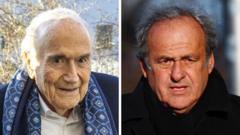Blatter and Platini Face Swiss Court in Fifa Fraud Case

- Sepp Blatter and Michel Platini are on trial in Switzerland for fraud related to a 2m Swiss francs payment.
- The payment was made in 2011 and authorized by Blatter.
- Both men deny wrongdoing, claiming the payment was for Platini's advisory work.
- The pair were acquitted in 2022, but the Swiss federal prosecutor appealed.
- The new trial is expected to last until Thursday, with a verdict due on 25 March.
Background of the Case
Sepp Blatter and Michel Platini, two prominent figures in the world of football, are facing a Swiss court for the second time in less than three years. The case revolves around a payment of 2m Swiss francs (£1.6m) made to Platini in 2011, which was authorized by Blatter. Both men have denied any wrongdoing, claiming the payment was a belated compensation for Platini's advisory work for Fifa.
In 2022, the pair were acquitted in a trial over the same payment, but the Swiss federal prosecutor appealed against the decision, leading to the current trial. The new trial is expected to last until Thursday, with a verdict due on 25 March.
The Trial
Blatter, 88, and Platini, 69, appeared before an appeals court in Muttenz, near Basel, on Monday. Blatter reaffirmed his innocence, stating that he had never engaged in falsehoods, lies, or deception throughout his life. A lawyer for Platini argued that the lower court that acquitted the pair in 2022 was right to find the disputed payment lawful.
Platini had a distinguished playing career, winning the Ballon d'Or three times and captaining France to victory in the 1984 European Championship. He also won the 1985 European Cup with Juventus and later became the president of Uefa in 2007.
Previous Investigations and Sanctions
In 2015, prosecutors accused Blatter and Platini of deceiving Fifa about payments made to Platini. Following an investigation launched in 2015, Swiss prosecutors accused the pair of forgery and fraud. Also in 2015, Fifa suspended both men from football for ethics breaches, initially for eight years, although their exclusions were later reduced.